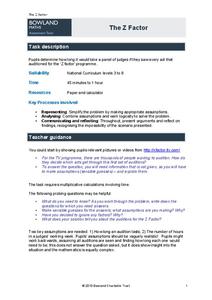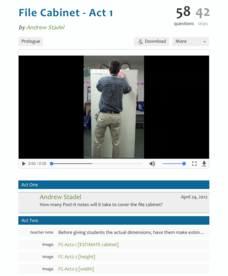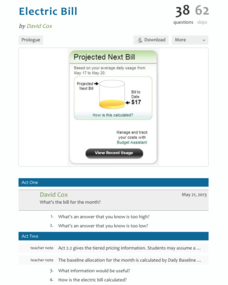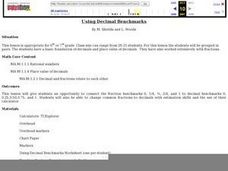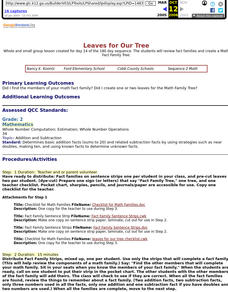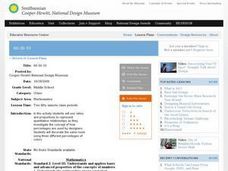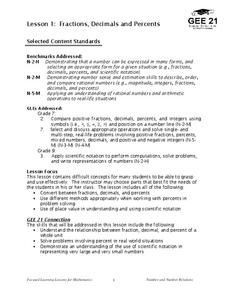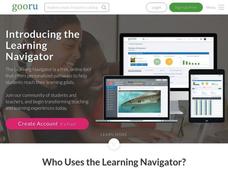Mathematics Assessment Project
Sampling and Estimating: Counting Trees
Your task today: count all the trees on a tree farm. To complete the assignment, learners first estimate the number of trees on a tree farm using random sampling. To improve their own response they then evaluate provided...
Bowland
The Z Factor
Young mathematicians determine the number of hours it would take judges of the "Z Factor" television talent show to watch every act. Participants make estimates and assumptions to solve the problem.
101 Questions
File Cabinet
Take the resource out of the file cabinet. Young mathematicians estimate the number of sticky notes it would take to cover the surface area of a file cabinet. They answer a set of questions on how the number of sticky notes would change...
Curated OER
The Search for Centimeters
Investigate the length of various objects in metrics! In this measurement lesson, 2nd graders estimate and find the length of objects in the classroom using centimeters.
Yummy Math
Valentine’s Day = Roses
Roses are red, but did you know that some are lighter while others are darker? Scholars read an infographic to decipher the fraction and percent of rose color and their country of origin. They go on to make comparisons and estimate while...
101 Questions
Electric Bill
A brilliant resource is at your disposal. Future consumers investigate and discuss an electric bill. Given only partial information, they estimate the monthly bill. They then consider how tiered pricing will affect the bill.
101 Questions
Blocks
Block play can teach children about gravity, physics, and spatial relationships. A hands-on lesson incorporates these concepts with an activity in which learners examine the relationship between levels in a pile. Scholars begin to...
Mathed Up!
Scatter Graphs
Make an estimate by getting in line. The class works with scatter plots and lines of best fit to make an estimate for given values. Pupils determine whether there is a positive or negative correlation and draw a best-fit line. Using the...
Curated OER
Life is Full of Problems
Pupils use the problem solving strategy of guess and check to investigate math word problems. They determine which problem solving strategy or strategies would work best in problem situations.
Curated OER
Add It Up In Number Ville! Adding 2-Digit Numbers With and Without Regrouping
Students explore adding 2-digit numbers. In this math lesson, students identify 2-digit numbers and use base ten blocks to practice adding. Students use addition to break a code.
Virginia Department of Education
Modeling Multiplication of Fractions
Multiply your understanding of multiplying fractions. A short lesson teaches pupils how to multiply fractions. By using fraction models, they get a better understanding of the concept.
Curated OER
Guess and Check Word Problems
Using the guess and check method, students solve six word problems involving multiplication and division. Each problem presents a different scenario for students to solve. The learning exercise could be used for individual or small group...
Curated OER
One Hundred Things
Learners practice estimating by handling items in groups of ten. They visualize how much space 100 items, such as pennies, peas, or beans, will take up after holding 10 of them. Learners measure the difference in volume between 10...
Curated OER
Using Decimal Benchmarks
Students demonstrate some common operations done while using fractions based upon mathematical standards. They are also changing common fractions to decimals with estimation skills and the use of a calculator.
Illustrative Mathematics
Cynthia's Perfect Punch
Using a real-world example, this problem illustrates the thought process that learners need to engage in to understand adding mixed numbers with common denominators. First by looking at estimation, and then by drawing models that...
Curated OER
Leaves for Our Tree
Young mathematicians review fact families and create a Math Fact Family Tree. This clever lesson plan includes some excellent printouts that support the lesson plan.
Curated OER
Rational, Irrational and Square Roots
Students identify rational and irrational numbers and their use in mathematical functions. Through demonstration, students discover the difference between rational and irrational numbers and their use. Using estimation skills students...
Curated OER
60-30-10
Students use ratios and proportions to represent quantitative relationships as they investigate the concept of how percentages are used by designers. Students decorate the same room using three different percentages of colors.
Curated OER
Compare Time
In this estimating time learning exercise, 2nd graders solve 6 problems in which the time it takes to perform a specific task is estimated. Students choose an estimate from two answers.
Shodor Education Foundation
Volume of Prisms
Explore the concept of volume of prisms using an applet to perform the calculations. The link to the interactive applet is embedded into the lesson plan as well as a link to associated data sheets. Get your math class to the computer lab...
Louisiana Department of Education
Fractions, Decimals, and Percents
Fractions, decimals, and percents all say the same thing! Show your classes how to convert between the three forms using visual and numeric representations. Then lead them to an understanding of scientific notation.
Illustrative Mathematics
Irrational Numbers on the Number Line
There are four irrational numbers that participants need to graph. Pi(π), -(½ x π), and √17 are easy to approximate with common rational numbers. On the other hand, the commentary describing the irrational number 2√2 is not...
Curated OER
It's About Time
First, second, and third graders explore elapsed time through estimation and prediction. They work with a partner to estimate how long it will take to perform various tasks. One person uses a stop watch to time his or her partner...
Curated OER
Inverse (Indirect) Machines
Students observe relationships between quantities. Students complete activities for three different classes of levers. In groups, students build each type of lever. Students identify levers in their daily surroundings. Students observe...

